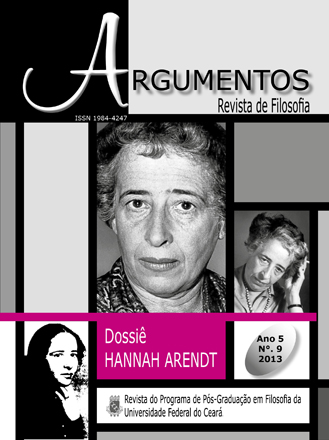Hannah Arendt and political thought: the art of distinguishing and relating concepts
Keywords:
Arendt. Political thinking. Conceptual distinctions. Rupture of tradition.Abstract
The text discusses Arendt’s peculiar political thought, whose originality and independence concerning classic ideological criteria such as right and left frequently arises perplexities amongst her readers. This situation is aggravated by the fact that Arendt offers no explanation concerning the methodological procedures that orient her political thought. My hypothesis is that the main characteristic of Arendt’s political thinking lies in its capacity of both distinguishing and relating the distinguished concepts, an interpretation that counters current critical readings that stress Arendt’s supposedly rigid and contemporarily unattainable concepts. Against those criticisms, I argue that by facing the rupture of tradition Arendt exercised a “thinking without banisters” which was neither dialectical nor squematic, a thinking that proceeded by simultaneously distinguishing and relating concepts, so that their own intelligibility depends on their own confrontation and correlation. Finally, I believe that by clarifying this Arendtian thought-procedure one is entitled to rereading her works, thus highlighting their relevance to understanding some of our social-political matters.Downloads
Published
Issue
Section
License
Argumentos magazine is licensed under an International Creative Commons Attribution License.
The Magazine uses CC BY inclusion
1) The authors retain the copyright granted to the magazine or the right to initial publication, with the work regularly licensed under the Creative Commons Attribution, which allows the sharing of the work with acknowledgment of authorship and initial publication in this magazine.
2) The authors are authorized to contract additional applicable contracts, for non-exclusive distribution of the version of the work published in this journal (for example, publication in the institutional repository or as a chapter of the book), recognition of authorship and initial publication in this journal.
3) Authors are authorized and encourage to publish and distribute their work online (for example, in institutional repositories or on their personal pages) at any time before or during the editorial process, as they can generate productive changes, as well as increase the impact and reference of published work.




.jpg)










._._3.png)
1.jpg)
._._._.png)
